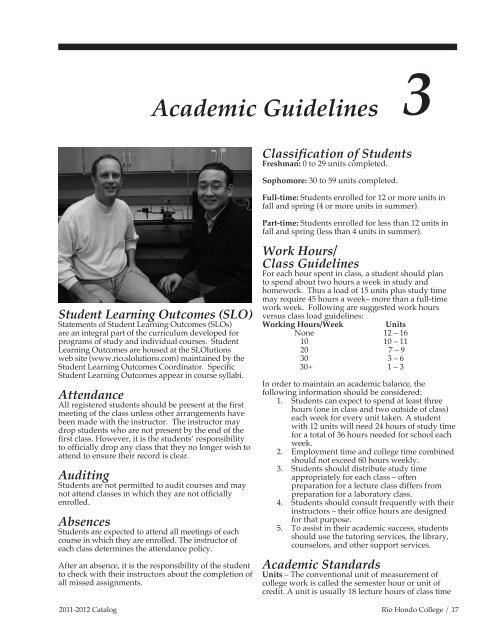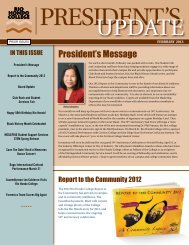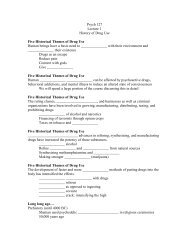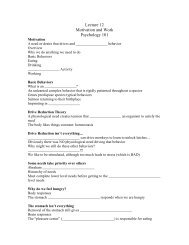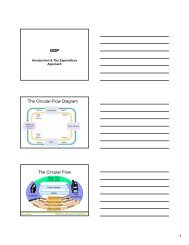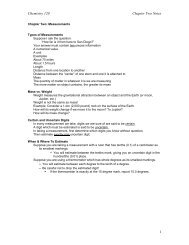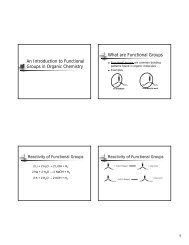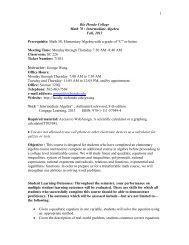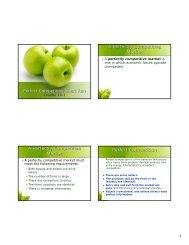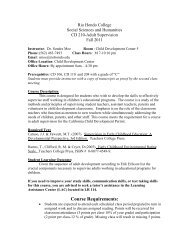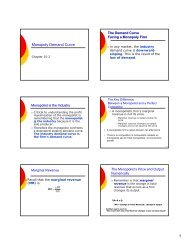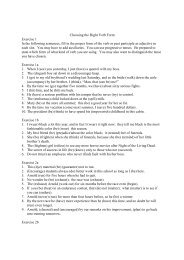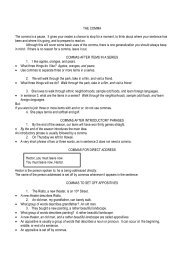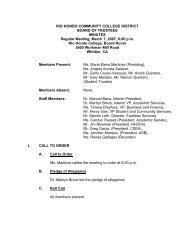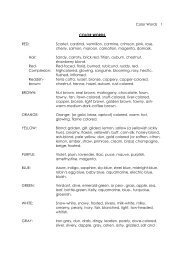Complete College Catalog 2011-2012 - Rio Hondo College
Complete College Catalog 2011-2012 - Rio Hondo College
Complete College Catalog 2011-2012 - Rio Hondo College
You also want an ePaper? Increase the reach of your titles
YUMPU automatically turns print PDFs into web optimized ePapers that Google loves.
Academic Guidelines<br />
Student Learning Outcomes (SLO)<br />
Statements of Student Learning Outcomes (SLOs)<br />
are an integral part of the curriculum developed for<br />
programs of study and individual courses. Student<br />
Learning Outcomes are housed at the SLOlutions<br />
web site (www.rio.slolutions.com) maintained by the<br />
Student Learning Outcomes Coordinator. Specific<br />
Student Learning Outcomes appear in course syllabi.<br />
Attendance<br />
All registered students should be present at the first<br />
meeting of the class unless other arrangements have<br />
been made with the instructor. The instructor may<br />
drop students who are not present by the end of the<br />
first class. However, it is the students’ responsibility<br />
to officially drop any class that they no longer wish to<br />
attend to ensure their record is clear.<br />
Auditing<br />
Students are not permitted to audit courses and may<br />
not attend classes in which they are not officially<br />
enrolled.<br />
Absences<br />
Students are expected to attend all meetings of each<br />
course in which they are enrolled. The instructor of<br />
each class determines the attendance policy.<br />
After an absence, it is the responsibility of the student<br />
to check with their instructors about the completion of<br />
all missed assignments.<br />
Classification of Students<br />
Freshman: 0 to 29 units completed.<br />
Sophomore: 30 to 59 units completed.<br />
3<br />
Full-time: Students enrolled for 12 or more units in<br />
fall and spring (4 or more units in summer).<br />
Part-time: Students enrolled for less than 12 units in<br />
fall and spring (less than 4 units in summer).<br />
Work Hours/<br />
Class Guidelines<br />
For each hour spent in class, a student should plan<br />
to spend about two hours a week in study and<br />
homework. Thus a load of 15 units plus study time<br />
may require 45 hours a week– more than a full-time<br />
work week. Following are suggested work hours<br />
versus class load guidelines:<br />
Working Hours/Week Units<br />
None 12 – 16<br />
10 10 – 11<br />
20 7 – 9<br />
30 3 – 6<br />
30+ 1 – 3<br />
In order to maintain an academic balance, the<br />
following information should be considered:<br />
1. Students can expect to spend at least three<br />
hours (one in class and two outside of class)<br />
each week for every unit taken. A student<br />
with 12 units will need 24 hours of study time<br />
for a total of 36 hours needed for school each<br />
week.<br />
2. Employment time and college time combined<br />
should not exceed 60 hours weekly.<br />
3. Students should distribute study time<br />
appropriately for each class – often<br />
preparation for a lecture class differs from<br />
preparation for a laboratory class.<br />
4. Students should consult frequently with their<br />
instructors – their office hours are designed<br />
for that purpose.<br />
5. To assist in their academic success, students<br />
should use the tutoring services, the library,<br />
counselors, and other support services.<br />
Academic Standards<br />
Units – The conventional unit of measurement of<br />
college work is called the semester hour or unit of<br />
credit. A unit is usually 18 lecture hours of class time<br />
<strong>2011</strong>-<strong>2012</strong> <strong>Catalog</strong> <strong>Rio</strong> <strong>Hondo</strong> <strong>College</strong> / 17


